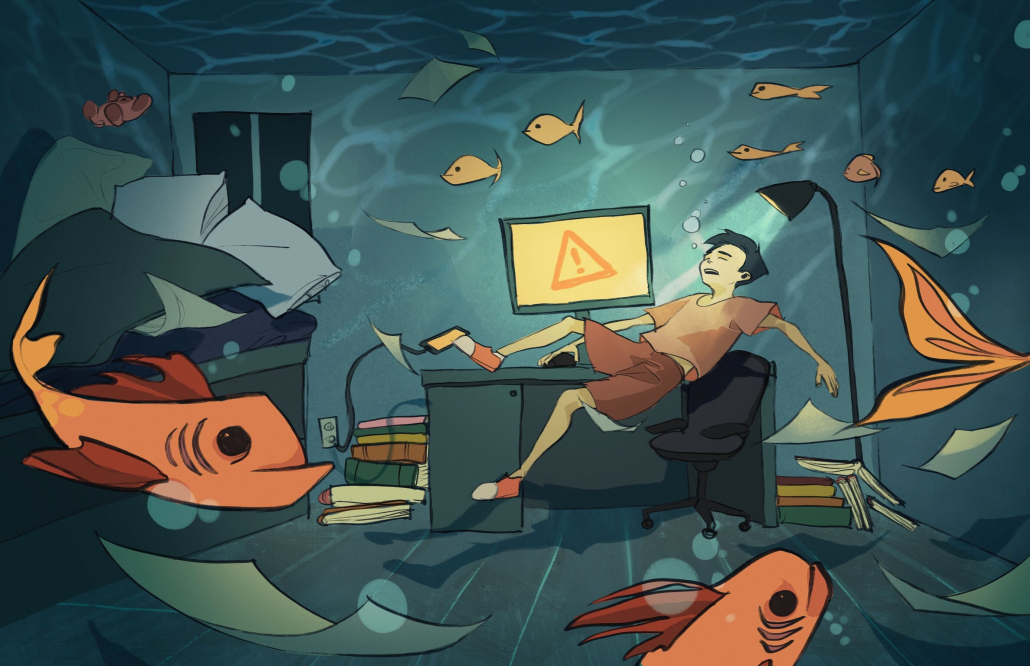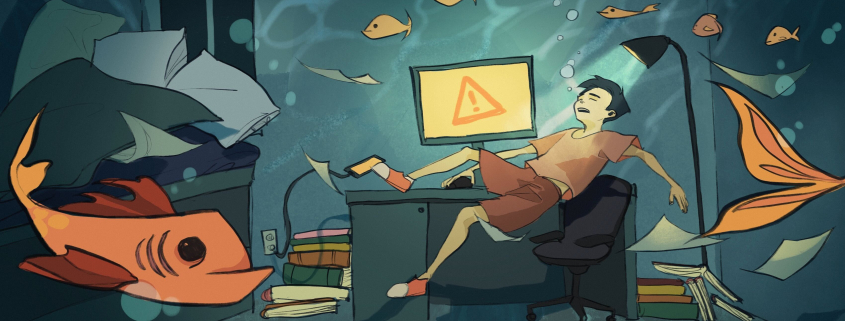(Don’t) just keep swimming

One, two, three, breathe. As I cut through the water, lactic acid pools in my quads. Wildfires ignite in my lungs.
One, two, three, breathe. Tumbling from one wall to the other, I chase after a 500 free record, longing for the crisp bite of the water. I can feel my sweat mixing with the pool chlorine.
One, two, three, breathe. With a firm grip on the tiled lip, I gasp for air in greedy gulps. Pausing briefly to bask in the last lights of the moon, I paddle towards the steps before pulling myself up onto my feet.
If you’ve ever swam in the Uytengsu dive pool, you’ll soon realize that Michael Phelps is a fish. 25 yards long (almost Olympic length), the deep end of the pool spans 17 feet. Its “shallow” end measures just short of seven feet. Back home, I swam regularly — 600 free, 400 back and, if I was feeling particularly angsty, 300 fly. At Uytengsu, however, despite years of swimming, I feel like a fish out of water. Even when my arms threaten to disjoint, I keep moving. I focus on the next extension. Ignoring my screaming muscles, I don’t have the energy to think about how the pool’s depth is more than three times my height. Or that if my body shorted in any way, I could drown. No, I just keep swimming.
On campus, it’s almost as if I’m still in the water. While I understand that university is designed to provide both professional and recreational opportunities, rather than being offered towels and water bottles, it often feels like students are pushed to produce quicker turnarounds and break PRs. Our coaches’ love language? Internship fairs, career open houses, professional newsletters, information sessions, competitive clubs, honor societies and resume workshops.
While there is the occasional mention of “do something nice for yourself or something…,” words of encouragement are few and far between.
At USC, competitive clubs and career/school stereotypes perpetuate a “just keep swimming” culture. At times, my friends have said “getting into a pre-professional club at USC is harder than getting into the university itself!” Out of courtesy, we all laugh — in pain. They’re not wrong — some consulting clubs, for example, accept as low as six percent of applicants. Logically, smaller teams make sense — they encourage efficiency and member specialization, allowing them to service clients like Google and TikTok as a toolbox of diverse, effective and innovative solutions. However, such low statistics allow for this hyper-competitive mindset to seep from club processes to the individual.
Soon, instead of swimming in pursuit of the infinite game — to challenge yourself, push your limits, and grow — you’ve become a mule to the finite. You can’t go the distance. With your consistent kicks and breathing pattern, you’ve trained yourself to go the 50, go the 100, go the 200. You’re swimming to reach the other wall, to hear the whistle, to towel off and leave practice. You’re not pulling yourself forward with every stroke; you’re at war with the water, trying to sprint and claw your way to the finish line. But in life, there is no finish line. Only checkpoints.
Piling on clubs, internships, challenging coursework and more, many students, fatigued, “just keep swimming.” Despite worn muscles, they fear if they don’t, their bodies will collapse and they will, if not immediately, eventually drown.
On any given morning, my inbox greets me groggily with a bundle of newsletters, club-related emails and a few Handshake notifications. I’ll admit, it’s a tad overwhelming. As a freshman studying Philosophy, Politics & Economics with Honors, I’m involved in organizations like the Trojans Scholar Society, the Consulting Club and the Ski Team. But, in order to “just keep swimming,” I need to come up for air and just float. Whether that be reveling in the chaos of the Lyon Center or strolling down the aisles of Trader Joe’s, I don’t work until my muscles give out — I utilize the pull buoys, foam boards and breaks around me.
I understand that leadership and strength don’t come from being the fastest or most impressive candidate – these traits are curated over time, persistently and continuously, from challenges and experiences. So when I feel tired, I rest and come up for air, because I’m not a fish like Phelps or Dory — I’m human. So if any of this resonated with you, stop swimming for a bit, you’ll be okay.
One, two, three, breathe.

